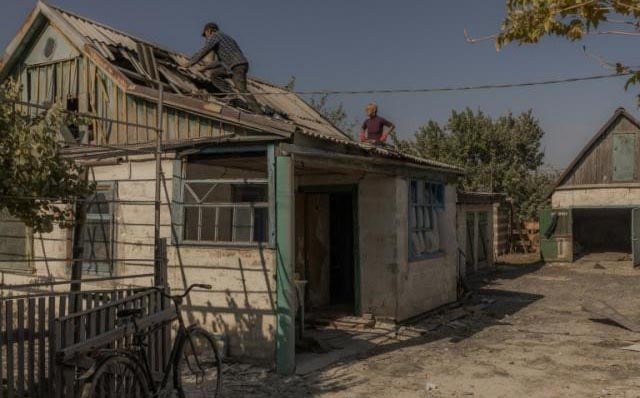
ROZLYV, Ukraine, Oct 17, 2024 (BSS/AFP) - Vasyl and Liliia Prus have already had to move home three times, fleeing advancing Russian forces in Ukraine's eastern Donetsk region.
Now their latest home in the small village of Rozlyv has been seriously damaged by a Russian strike.
"Where should we go?" Vasyl asked as he stood with his wife in their partially destroyed house.
"I don't know. We have nowhere to go. We are refugees," she said.
Russian troops are stationed about 20 kilometres (12 miles) away, in an area where the eastern and southern fronts meet.
In early October, Russia took the town of Vugledar, a Ukrainian stronghold that Kyiv's troops had held for two-and-a-half years.
The town's capture showed the precarious situation of Ukraine's armed forces, smaller in number and less well-armed than the Russians.
Ukraine's bold gamble to launch an offensive into Russia's Kursk region in August in part to force Moscow to divert troops from eastern Ukraine so far has not paid off.
Many villagers in this area fear Russia's advance past Vugledar means the intensity of strikes will grow -- along with the risk of occupation.
For Liliia Prus, having to pack up and leave once again was unbearable.
"I don't have the strength to run away," said the 46-year-old with cropped blonde hair.
The couple are instead going to move into an outbuilding next to their house, which was a little less damaged.
- Kurakhove in danger -
The capture of Vugledar "will not on its own radically change" the situation in the area, the Institute for the Study of War said in early October.
But taking this defensive stronghold, located on raised ground and close to many important roads, gives Russia a tactical advantage.
Around 50 kilometres to the north, Russian troops are also only about eight kilometres from Pokrovsk, a logistics hub for the Ukrainian army.
Russia hopes that by capturing Pokrovsk it will also increase pressure on the southern front towards Zaporizhzhia, where attacks are already becoming more frequent.
"If we take this city (Pokrovsk), it will be a very serious blow... we will basically clean up the whole southern Donetsk direction and... put pressure on the enemy's Zaporizhzhia group of forces," Igor Kimakovsky, a Moscow-backed official in occupied Donetsk, told Russia's RIA Novosti news agency.
The industrial town of Kurakhove in the same region also seems close to falling to Russian forces. Moscow's troops are at its gates, a few kilometres from the centre.
"We will contain them a little bit longer," said Yaroslav, sergeant-major of a company of the 110th brigade fighting close to the town.
But that will be dependent on fresh supplies of equipment and ammunition, he said.
Another soldier, Arkhip, gave a similar prediction, complaining that he has to work with vehicles that do not always function.
"The war will be won by the side with the better logistics," said the 40-year-old with the 33rd brigade.
Another problem for Ukraine is the lack of new recruits.
Those who have been at the front for two-and-a-half years are often exhausted and traumatised.
And there is a lack of new volunteers to replace them while mobilisation is sluggish, despite a new law expanding it.
Arkhip said he has suffered from "panic attacks" due to the bombardment and landmines.
He said he is the last one from his original unit still at the front.
"They send some people, but it's never enough," he said.
- Guided bombs -
In the empty streets of Kurakhove, buildings with blown-out windows stand next to piles of rubble.
Liubov Solod and her husband Ivan, 65, have both decided to leave.
For her husband, it was too hard to say a final farewell to their home, adding that he still hopes they might be able to return one day.
"Who knows? Hope dies last," he said.
Some of their family members have fled to Odesa in southwestern Ukraine. But that port city is also coming under increasing attack.
Further east but still in the south, Zaporizhzhia is now being hit by Russia's powerful guided bombs, the same type that have ravaged Vugledar.
The situation is "bad", said psychologist Andriy Lastovliak, who works in a specialised centre in Zaporizhzhia run by NGO Project Hope.
He noted that, among hundreds of patients, there is a high level of anxiety and "different kinds of neuroses", such as obsessive thoughts and sleep disorders.
In such a situation, he said, it is hard "to see a future".